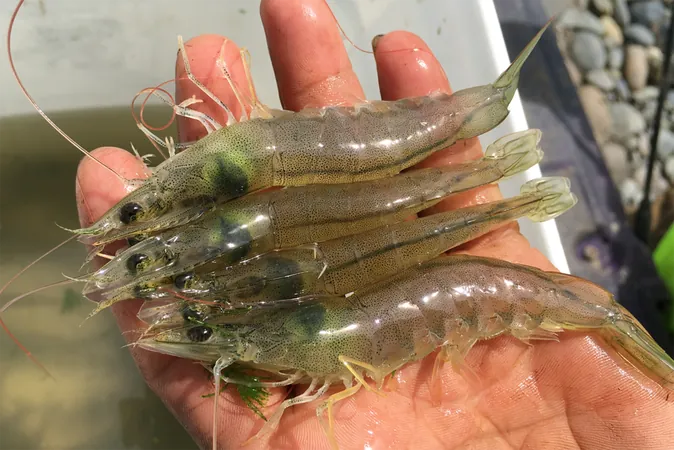
Plant-Based Diets Revolutionize Genetic Improvement and Feed Efficiency in Pacific White Shrimp
2024-12-16
Author: Arjun
Introduction
In an exciting breakthrough for aquaculture, recent studies reveal that certain families of Pacific white shrimp (*Penaeus vannamei*) demonstrate remarkable feed efficiency when raised on a plant-based diet, challenging the longstanding dominance of fishmeal diets in shrimp farming.
Understanding Feed Efficiency Metrics
Selective breeding for feed efficiency (FE) relies heavily on understanding which traits to prioritize. Traditional metrics such as feed efficiency ratio (FER) and feed conversion ratio (FCR) can mislead efforts since they do not account for variations in growth or feed intake. Instead, researchers suggest using residual feed intake (RFI) as a more accurate gauge of efficiency. RFI measures the discrepancy between the actual feed consumed and the expected intake, providing insights into an animal's utilization efficiency. A negative RFI indicates lower than expected feed consumption, while a positive RFI signifies higher intake, with lower RFI values being more desirable for efficient feed utilization.
Research exploring RFI in aquatic species, particularly shrimp, has been limited compared to terrestrial livestock. Studies have primarily focused on fish like Nile tilapia and rainbow trout, with only a few investigating RFI in white shrimp and related species. This study shines a light on the importance of genetically improving feed efficiency traits in *P. vannamei*, particularly in the context of reducing reliance on fish-based feeds, an issue given rising fishmeal prices and sustainability concerns.
The Study Overview
Conducted in 2023 at the BLUP Aquabreed Co. Ltd. shrimp breeding center in Weifang, China, the study evaluated 30 full-sib families of *P. vannamei*. The researchers compared the impacts of a plant-based diet, devoid of fishmeal, to a traditional diet containing 25% fishmeal, assessing various performance metrics such as RFI, average daily weight gain (ADG), and daily feed intake (DFI).
During a pivotal 42-day feeding trial, the shrimp acclimated to their diets over a week. Careful monitoring ensured that feed was consumed effectively, with leftover pellets collected and weighed. The study tracked survival rates, noting that the majority of shrimp died due to accidental jumping from tanks rather than dietary causes.
Results and Insights
The findings revealed a significant difference in RFI between diets: shrimp on the plant-based diet had an average RFI of 0.0049 grams per day, while those on fishmeal had a negative RFI of -0.0045 grams per day, indicating that fishmeal diets were more efficient. Interestingly, five families showed comparable or higher efficiency on the plant-based diet, hinting at significant genetic variability and the potential for selective breeding programs focused on optimizing plant protein utilization.
Average body weight (FBW) and ADG were notably higher in shrimp fed the fishmeal diet, validating the traditional belief in the superiority of fishmeal for rapid growth. However, the daily feed intake was similar across diets, suggesting that the shrimp readily accepted plant-based feed without compromising palatability.
Soybean and peanut meals emerged as promising plant proteins, effectively replacing fishmeal in shrimp diets. While the conventional fishmeal diet yielded a staggering 155.8% increase in growth rates, it is crucial to explore how these advancements affect overall profitability in commercial shrimp farming.
The heritability estimates for RFI were intriguingly high in both dietary contexts, indicating genetic potential for improving feed efficiency even with plant-based diets, despite environmental factors potentially skewing these figures. Furthermore, while plant-based diets resulted in lower overall growth rates, the significant heritability indicates a road for future selective breeding efforts aimed at improving plant protein utilization.
Future Implications
This research highlights the moderate interactions between shrimp genotype and diet, reinforcing the need for tailored breeding programs that could leverage plant-based nutrition. The findings are not just significant for the shrimp industry but could pave the way for sustainable aquaculture practices globally. With the demand for sustainable seafood on the rise, discovering and optimizing plant-based diets could become a key factor in improving shrimp farming efficiency and profitability.
As this area of research continues to expand, the implications for both environmental sustainability and food security are immense. Could shifting to plant-based diets revolutionize shrimp farming? Experts believe this might just be the beginning of a new era in aquaculture!


 Brasil (PT)
Brasil (PT)
 Canada (EN)
Canada (EN)
 Chile (ES)
Chile (ES)
 España (ES)
España (ES)
 France (FR)
France (FR)
 Hong Kong (EN)
Hong Kong (EN)
 Italia (IT)
Italia (IT)
 日本 (JA)
日本 (JA)
 Magyarország (HU)
Magyarország (HU)
 Norge (NO)
Norge (NO)
 Polska (PL)
Polska (PL)
 Schweiz (DE)
Schweiz (DE)
 Singapore (EN)
Singapore (EN)
 Sverige (SV)
Sverige (SV)
 Suomi (FI)
Suomi (FI)
 Türkiye (TR)
Türkiye (TR)